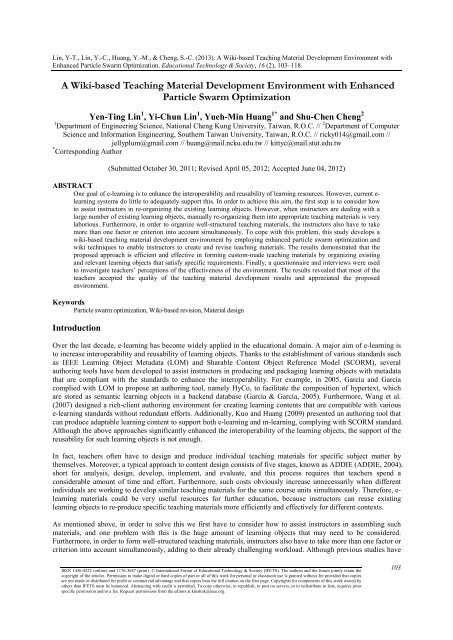Download Complete Issue in PDF - Educational Technology & Society
Download Complete Issue in PDF - Educational Technology & Society
Download Complete Issue in PDF - Educational Technology & Society
You also want an ePaper? Increase the reach of your titles
YUMPU automatically turns print PDFs into web optimized ePapers that Google loves.
L<strong>in</strong>, Y-T., L<strong>in</strong>, Y.-C., Huang, Y.-M., & Cheng, S.-C. (2013). A Wiki-based Teach<strong>in</strong>g Material Development Environment with<br />
Enhanced Particle Swarm Optimization. <strong>Educational</strong> <strong>Technology</strong> & <strong>Society</strong>, 16 (2), 103–118.<br />
A Wiki-based Teach<strong>in</strong>g Material Development Environment with Enhanced<br />
Particle Swarm Optimization<br />
Yen-T<strong>in</strong>g L<strong>in</strong> 1 , Yi-Chun L<strong>in</strong> 1 , Yueh-M<strong>in</strong> Huang 1* and Shu-Chen Cheng 2<br />
1 Department of Eng<strong>in</strong>eer<strong>in</strong>g Science, National Cheng Kung University, Taiwan, R.O.C. // 2 Department of Computer<br />
Science and Information Eng<strong>in</strong>eer<strong>in</strong>g, Southern Taiwan University, Taiwan, R.O.C. // ricky014@gmail.com //<br />
jellyplum@gmail.com // huang@mail.ncku.edu.tw // kittyc@mail.stut.edu.tw<br />
* Correspond<strong>in</strong>g Author<br />
(Submitted October 30, 2011; Revised April 05, 2012; Accepted June 04, 2012)<br />
ABSTRACT<br />
One goal of e-learn<strong>in</strong>g is to enhance the <strong>in</strong>teroperability and reusability of learn<strong>in</strong>g resources. However, current elearn<strong>in</strong>g<br />
systems do little to adequately support this. In order to achieve this aim, the first step is to consider how<br />
to assist <strong>in</strong>structors <strong>in</strong> re-organiz<strong>in</strong>g the exist<strong>in</strong>g learn<strong>in</strong>g objects. However, when <strong>in</strong>structors are deal<strong>in</strong>g with a<br />
large number of exist<strong>in</strong>g learn<strong>in</strong>g objects, manually re-organiz<strong>in</strong>g them <strong>in</strong>to appropriate teach<strong>in</strong>g materials is very<br />
laborious. Furthermore, <strong>in</strong> order to organize well-structured teach<strong>in</strong>g materials, the <strong>in</strong>structors also have to take<br />
more than one factor or criterion <strong>in</strong>to account simultaneously. To cope with this problem, this study develops a<br />
wiki-based teach<strong>in</strong>g material development environment by employ<strong>in</strong>g enhanced particle swarm optimization and<br />
wiki techniques to enable <strong>in</strong>structors to create and revise teach<strong>in</strong>g materials. The results demonstrated that the<br />
proposed approach is efficient and effective <strong>in</strong> form<strong>in</strong>g custom-made teach<strong>in</strong>g materials by organiz<strong>in</strong>g exist<strong>in</strong>g<br />
and relevant learn<strong>in</strong>g objects that satisfy specific requirements. F<strong>in</strong>ally, a questionnaire and <strong>in</strong>terviews were used<br />
to <strong>in</strong>vestigate teachers’ perceptions of the effectiveness of the environment. The results revealed that most of the<br />
teachers accepted the quality of the teach<strong>in</strong>g material development results and appreciated the proposed<br />
environment.<br />
Keywords<br />
Particle swarm optimization, Wiki-based revision, Material design<br />
Introduction<br />
Over the last decade, e-learn<strong>in</strong>g has become widely applied <strong>in</strong> the educational doma<strong>in</strong>. A major aim of e-learn<strong>in</strong>g is<br />
to <strong>in</strong>crease <strong>in</strong>teroperability and reusability of learn<strong>in</strong>g objects. Thanks to the establishment of various standards such<br />
as IEEE Learn<strong>in</strong>g Object Metadata (LOM) and Sharable Content Object Reference Model (SCORM), several<br />
author<strong>in</strong>g tools have been developed to assist <strong>in</strong>structors <strong>in</strong> produc<strong>in</strong>g and packag<strong>in</strong>g learn<strong>in</strong>g objects with metadata<br />
that are compliant with the standards to enhance the <strong>in</strong>teroperability. For example, <strong>in</strong> 2005, García and García<br />
complied with LOM to propose an author<strong>in</strong>g tool, namely HyCo, to facilitate the composition of hypertext, which<br />
are stored as semantic learn<strong>in</strong>g objects <strong>in</strong> a backend database (García & García, 2005). Furthermore, Wang et al.<br />
(2007) designed a rich-client author<strong>in</strong>g environment for creat<strong>in</strong>g learn<strong>in</strong>g contents that are compatible with various<br />
e-learn<strong>in</strong>g standards without redundant efforts. Additionally, Kuo and Huang (2009) presented an author<strong>in</strong>g tool that<br />
can produce adaptable learn<strong>in</strong>g content to support both e-learn<strong>in</strong>g and m-learn<strong>in</strong>g, comply<strong>in</strong>g with SCORM standard.<br />
Although the above approaches significantly enhanced the <strong>in</strong>teroperability of the learn<strong>in</strong>g objects, the support of the<br />
reusability for such learn<strong>in</strong>g objects is not enough.<br />
In fact, teachers often have to design and produce <strong>in</strong>dividual teach<strong>in</strong>g materials for specific subject matter by<br />
themselves. Moreover, a typical approach to content design consists of five stages, known as ADDIE (ADDIE, 2004),<br />
short for analysis, design, develop, implement, and evaluate, and this process requires that teachers spend a<br />
considerable amount of time and effort. Furthermore, such costs obviously <strong>in</strong>crease unnecessarily when different<br />
<strong>in</strong>dividuals are work<strong>in</strong>g to develop similar teach<strong>in</strong>g materials for the same course units simultaneously. Therefore, elearn<strong>in</strong>g<br />
materials could be very useful resources for further education, because <strong>in</strong>structors can reuse exist<strong>in</strong>g<br />
learn<strong>in</strong>g objects to re-produce specific teach<strong>in</strong>g materials more efficiently and effectively for different contexts.<br />
As mentioned above, <strong>in</strong> order to solve this we first have to consider how to assist <strong>in</strong>structors <strong>in</strong> assembl<strong>in</strong>g such<br />
materials, and one problem with this is the huge amount of learn<strong>in</strong>g objects that may need to be considered.<br />
Furthermore, <strong>in</strong> order to form well-structured teach<strong>in</strong>g materials, <strong>in</strong>structors also have to take more than one factor or<br />
criterion <strong>in</strong>to account simultaneously, add<strong>in</strong>g to their already challeng<strong>in</strong>g workload. Although previous studies have<br />
ISSN 1436-4522 (onl<strong>in</strong>e) and 1176-3647 (pr<strong>in</strong>t). © International Forum of <strong>Educational</strong> <strong>Technology</strong> & <strong>Society</strong> (IFETS). The authors and the forum jo<strong>in</strong>tly reta<strong>in</strong> the<br />
copyright of the articles. Permission to make digital or hard copies of part or all of this work for personal or classroom use is granted without fee provided that copies<br />
are not made or distributed for profit or commercial advantage and that copies bear the full citation on the first page. Copyrights for components of this work owned by<br />
others than IFETS must be honoured. Abstract<strong>in</strong>g with credit is permitted. To copy otherwise, to republish, to post on servers, or to redistribute to lists, requires prior<br />
specific permission and/or a fee. Request permissions from the editors at k<strong>in</strong>shuk@ieee.org.<br />
103

















